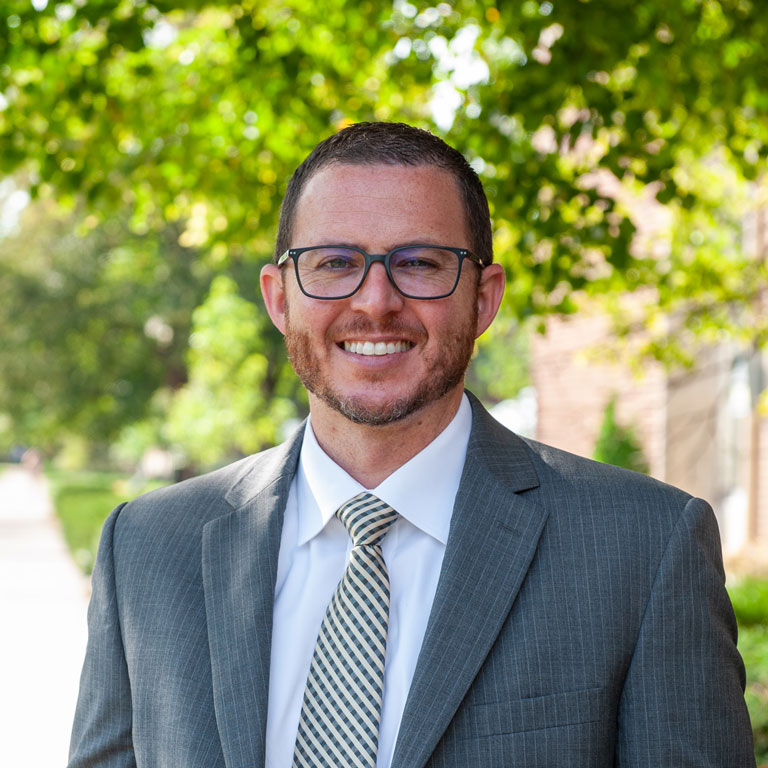CAPS Seeks to Promote Community of Care

As the need for mental health services continues to grow on college campuses, Purdue Counseling and Psychological Services (CAPS) is working to engage the community and provide access to mental health services for Boilermakers.
A study conducted by the National Alliance on Mental Health Illness (NAMI) estimates that one in four young adults between the ages of 18 and 24 have a diagnosed mental health illness and more than 25 percent of college students have been diagnosed or treated by a professional for a mental health condition. Almost 73 percent of students living with a mental health condition experienced a mental health crisis on campus.
Chris Hanes, the new senior director of CAPS, is working to engage campus and community partners to create what he calls a “community of care” that can support Purdue students. Part of that work involves connecting with faculty and staff, cultural centers and other student groups to take advantage of campus and community resources that support students and can promote an open dialogue about their mental health.
“Mental health and academic success are inextricably linked,” Hanes says. “When we’re engaging the community, we want to build a system that supports all students at every level of need – and we need to mobilize the community as partners in a way that promotes holistic wellness and academic success for our Boilermakers.”
We want to build a system that supports all students at every level of need.
One of the ways CAPS is working to mobilize the community is by engaging with cultural centers which, Hanes says, offers a particularly important opportunity to engage students who may face unique stressors and challenges. More importantly, these cultural centers can be spaces to have open conversations about these unique challenges to promote mental health and wellness of students.
“What’s important about these face-to-face opportunities is that they are nonclinical,” Hanes says. “You don’t need to be a CAPS client to have access to that. It’s an opportunity to informally talk about mental health in turns and well-being concerns, and then help determine if there need to be any next steps.”
In addition to engaging campus and community organizations to create a community of care, CAPS is working to expand access to its own services. A student’s initial contact with CAPS comes through a brief phone screening with a clinician. During this brief, confidential discussion, students and clinicians work together to assess the nature and urgency of the student’s concern and identify the most appropriate next steps.
CAPS has allotted up to 40 percent of its clinical capacity to these initial consultations in order to increase access for students. The goal is to hold an initial consultation with a student the same day or day after they first contact CAPS.
Options for next steps may include referral to various campus resources, group counseling, workshops, assessments, brief individual counseling at CAPS and, in some cases, referrals to community agencies and resources. Hanes notes that CAPS will offer 62 workshops and 20 groups during the fall semester.
Addressing immediate and ongoing mental health effects caused by the COVID-19 pandemic are also parts of CAPS’ work. The pandemic has also created a unique opportunity to normalize and destigmatize aspects of the mental health conversation due to its widespread impact.
“It is natural to have a level of stress or level of sadness in response to a trauma that we have all experienced,” Hanes says. “Talking about this from a psychoeducation standpoint helps normalize the struggles people have had over the last 18 month s and creates a dialogue and conversation around it in a very healthy way. There’s a lot of opportunity to have a conversation around mental health because everyone sees it, feels it and know it’s important.”
There’s a lot of opportunity to have a conversation around mental health because everyone sees it, feels it and know it’s important.
Engaging and partnering with student-led groups and initiatives, such as the Steps to Leaps student organization and Purdue Student Government’s Mental Health Action Week (scheduled for October 19-23, 2021), provide further opportunities to create a community culture of care.
“Peer-based support, conversations and programs are powerful and, to me, incredibly appealing,” Hanes says. “We want to be part of that. Peer programs promote help-seeking and healthy dialogue around mental health.”
Hanes previously served as the director of Student Counseling Services at Iowa State University. He also previously held associate director positions with student counseling centers at the University of Cincinnati and University of Central Florida. Hanes earned a doctorate in counseling psychology from Indiana University. While completing his doctoral work, he worked with a variety of collegiate counseling programs. He earned a bachelor’s degree in psychology from Indiana University and completed a master’s degree in counseling at the University of New Hampshire.
CAPS is a team of multicultural professionals who deliver comprehensive psychological services to Purdue students. CAPS helps Purdue students maximize the value of their life experiences by developing collaborative relationships in a safe and respectful environment. CAPS’ portfolio of professional services includes individual, group and couples' psychotherapy; psychological testing; psychopharmacology; crisis intervention; drug and alcohol programs; outreach and consultation; and the training of helping professionals.
 .
.